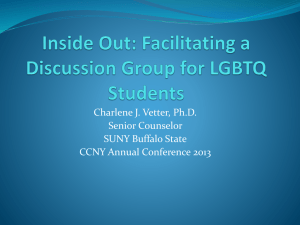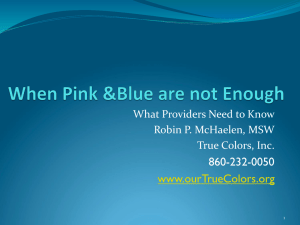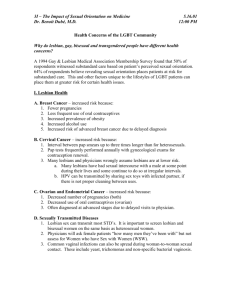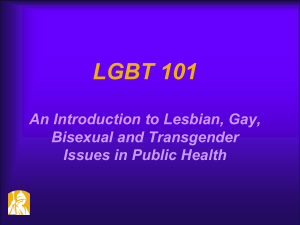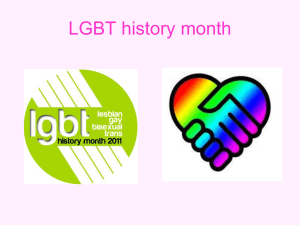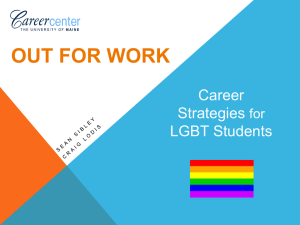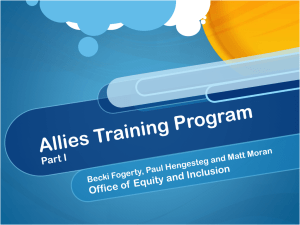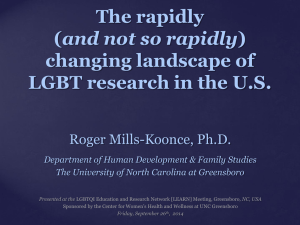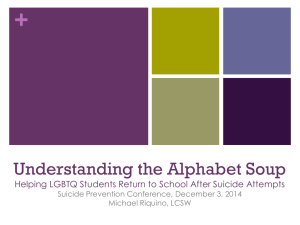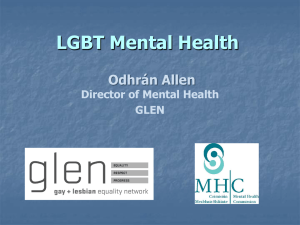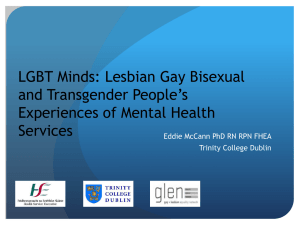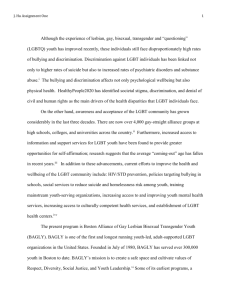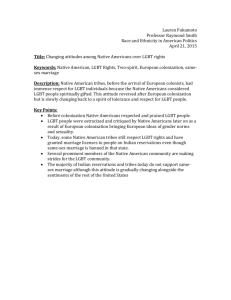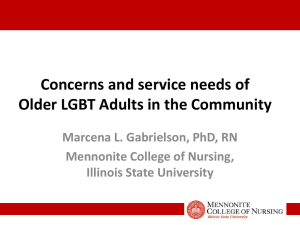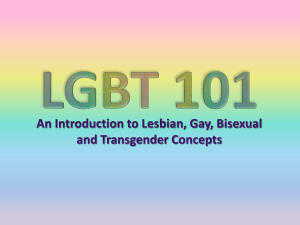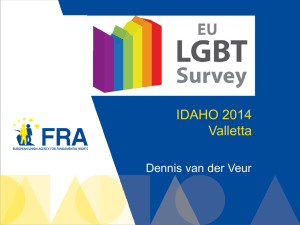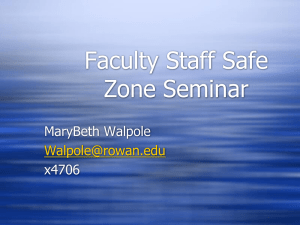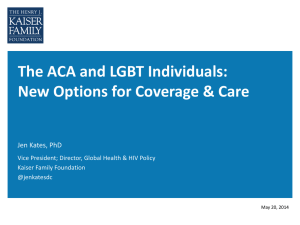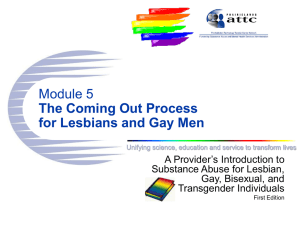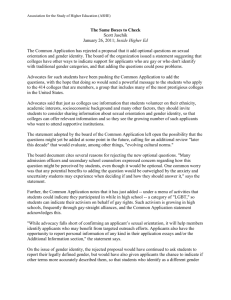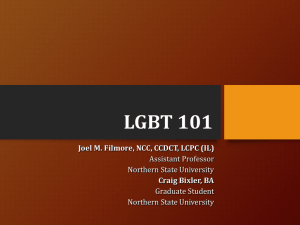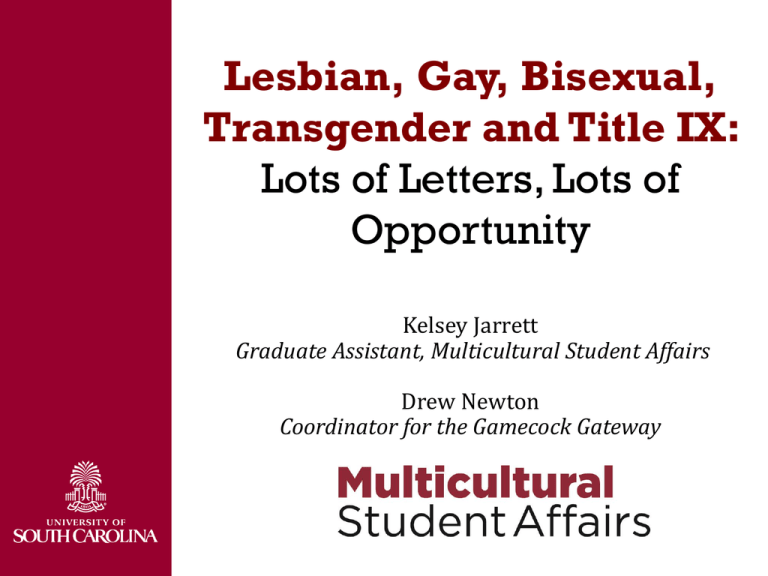
Lesbian, Gay, Bisexual,
Transgender and Title IX:
Lots of Letters, Lots of
Opportunity
Kelsey Jarrett
Graduate Assistant, Multicultural Student Affairs
Drew Newton
Coordinator for the Gamecock Gateway
Teambuilder/
Icebreaker
Learning Outcomes
Through the workshop participants will:
• Understand how Title IX applies to
the LGBT community
• Understand USC’s nondiscrimination
clause and its relationship to sexual
orientation and gender identity
• Recognize elements that can create a
hostile environment for LGBT
students, faculty, and staff
• Recognize what violence looks like
within the LGBT community
• Utilize and know the on-campus
resources
By the Numbers
A Look at LGB Statistics Nationally
• Approximately 3.5% of adults in the USA are
LGB and 0.3% of adults are transgender =
9 million LGBT Americans
• An estimated 1.8% of adults identify as
bisexual compared to 1.7 % as lesbian or
gay
• 19 million Americans (8.2%) report they
have engaged in same-sex sexual behavior
and nearly 25.6 million Americans (11%)
acknowledge at least some same-sex sexual
attraction
By the Numbers
A Look at LGB Statistics in South Carolina
• In 2005, there were an
estimated 117,033 gay,
lesbian, and bisexual
people living in South
Carolina.
• In 2010, there were
approximately
7,214 same-sex couples
in South Carolina.
REMINDER:
Not everyone is
heterosexual!
Not everyone simply
identifies as “male” or
“female.”
Terminology
Terms Associated with
Sexual Orientation and
Gender Identity
The Genderbread Person
By: It's Pronounced Metrosexual
What does Title IX say?
Remember: This is not exclusively
male/female or female/male.
Remember: This applies to campus inclusion
at large. One incident of orientation/identity
bias can create a hostile environment.
What does Title IX say?
What Does USC’s
Nondiscrimination Clause Say?
“The University of South Carolina does not
discriminate in educational or employment
opportunities or decisions on the basis of
personal characteristics that are not
relevant to an individual's abilities,
qualifications, or job performance. Under
federal and state law, these characteristics
include age, race, color, sex, religion,
national origin, and disability status. It is
the policy of the University that an
individual's sexual orientation be
treated in the same manner.”
How Do We Compare?
USC is a part of the:
• 85% of schools that have a professional staff member for the
LGBTQ community
• 71% that do NOT include gender identity in the nondiscrimination policy or in any diversity statements
• 57% that have provided resources for trans* students such
as a list of gender neutral bathrooms on campus
USC is not part of the:
• 81% of schools that allow students to put their preferred
name on campus directories, class rosters and student ID
cards (can only change name and email alias on the online
directory)
• 30% of schools that have gender neutral housing
Star Activity
Elements of a
Hostile Environment
According to a
2009 study…
• 72% of LGBT students heard homophobic
remarks such as "faggot" or "dyke" frequently at
school.
• 61% of students reported feeling unsafe in
school because of their sexual orientation; 40% felt
unsafe because of their gender expression.
• 40% of LGBT students reported physical
harassment because of their sexual orientation;
27% were physically harassed because of their
gender expression.
Elements of a
Hostile Environment
…on a student’s academic progress
• 29.1% of LGBT students missed a class at
least once and 30.0% missed at least one
day of school in the past month because
of safety concerns.
• 2.7 = the average GPA of students who
were frequently harassed because of their
sexual orientation/gender expression.
2009 National School Climate Survey
Elements of a
Hostile Environment
According to a 2010 study…
• 1/3 of LGBTQ college students
seriously considered leaving or
left their institution because
they weren’t accepted.
• 23% reported experiencing
harassment…with 83% saying
it was because of their sexual orientation.
• Just under half of all faculty, students, & staff
hide their sexual identity (43%) or gender
identity (63%) to avoid intimidation.
LGBT Multiculturalism
Multiple layers of oppression
Societal reactions to their identity
Racial prejudice
Limited economic resources
Limited acceptance within
community/culture
– Limited acceptance or understanding within
the LGBT community
– Lack of role models (at large and in the
racial/ethnic community)
–
–
–
–
Harper, G. W., Jernewall, N., & Zea, M. C. (2004). Giving
voice to emerging science and theory for lesbian, gay, and
bisexual people of color. Cultural Diversity and Ethnic
Minority Psychology, 10(3), 187-199.
The Environment’s Impact
…on a student’s overall wellness
• Mental Health Concerns (isolation; low
self-esteem; depression; anxiety; suicidal
ideations)
• Substance Abuse
(tobacco/alcohol/drug abuse)
• Discrimination/Harassment
• Relationship Concerns (Friends; Family
Members; Intimate Relationships; Sexual
Relationships; Interpersonal Violence)
Homophobia in Action
Tyler Clementi (2010)
18 years old
Gwen Araujo (2003)
17 years old
Raymond Chase (2010)
19 years old
Sean Kennedy (2007)
21 years old
Violence in the LGBT Community
• Occurs at similar rates to heterosexual couples
• The Center for American Progress reports:
–One out of four to one out of three same-sex
relationships has experienced domestic violence.
–A common tactic is threatening to “out” the other
individual
–“Lesbian and gay victims are more reluctant to
report abuse to legal authorities. Survivors may not
contact law enforcement agencies because doing
so would force them to reveal their sexual
orientation or gender identity.”
–“Gay and lesbian victims are also reluctant to seek
help out of fear of showing a lack of solidarity
among the gay and lesbian community. Similarly,
many gay men and women hide their abuse out of a
heightened fear that society will perceive same-sex
relation- ships as inherently dysfunctional.”
http://www.americanprogress.org/issues/lgbt/news/2011/06/14/9850/domestic-violence-in-the-lgbt-community/
Violence in the LGBT Community
• The Center for American Progress reports:
–“Gay and lesbian victims are more likely to
fight back than are heterosexual women. This
can lead law enforcement to conclude that the
fighting was mutual, overlooking the larger
context of domestic violence and the history of
power and control in the relationship.”
– Authorities also lack information/an
understanding of same-sex relationships
–Varying levels of protection across states and
municipalities
http://www.americanprogress.org/issues/lgbt/news/2011/06/14/9850/domestic-violence-in-the-lgbt-community/
How do we create an
inclusive Carolina?
• Avoid assumptions that all students are
heterosexual or operate on a binary
gender identity scale
• Get to know—and challenge—your
community
• Provide role models
• Understand what the laws and our
policies state
• Know your resources
• Unite Carolina!
On Campus Resources
Sexual Assault and Violence Intervention &
Prevention (Stand Up Carolina)
Thomson Student Health Center, First Floor
www.sa.sc.edu/shs/savip
• 1:1 appointments regarding sexual assault and
relationships violence
• Coordinate the university’s bystander
accountability program
On Campus Resources
LGBT Programs and Services
Russell House West Wing – Lower Level
lgbtusc@mailbox.sc.edu | 803.777.7716
• Programming and presentations
• 1:1 and group meetings
• Online resources at www.sa.sc.edu/omsa
Safe Zone strives to…
• Educate the campus community
• Provide assistance to our LGBT
and Ally Gamecocks
• Retain LGBT faculty, staff, and
students
• Help all Carolinians understand
their role in providing a safe,
inclusive environment
Safe Zone does not attempt to…
• Take a political or religious
stand
• Force participation in
uncomfortable or exceptionally
personal activities
• Require individuals to become
Allies
• Push individuals to
“come out”
On Campus Resources
Bisexual, Gay, Lesbian, Straight Alliance
Meets every Tuesday at 8 p.m. in Currell 107
www.facebook.com/bglsa
• Signature events such as Ms. Gaymecock and
The Birdcage
• Weekly social and educational opportunities
• Programs and community service
On Campus Resources
Counseling & Human Development Center
Byrnes Building, 7th Floor
(across from the Horseshoe)
www.sa.sc.edu/shs/chdc
• 1:1 appointments
• Weekly LGBT Support Group (Fridays at 1:30 p.m.)
• Suicide Prevention Services
Resources in our Area
• Monthly potlucks
• “Undefined Gender” support and
dialogue group
• Youth OUTLoud and faith-based groups
• YEAH! – Youth Empowered Against HIV
“In the end, we will
remember not the words of
our enemies, but the
silence of our friends.”
-Dr. Martin Luther King, Jr.


